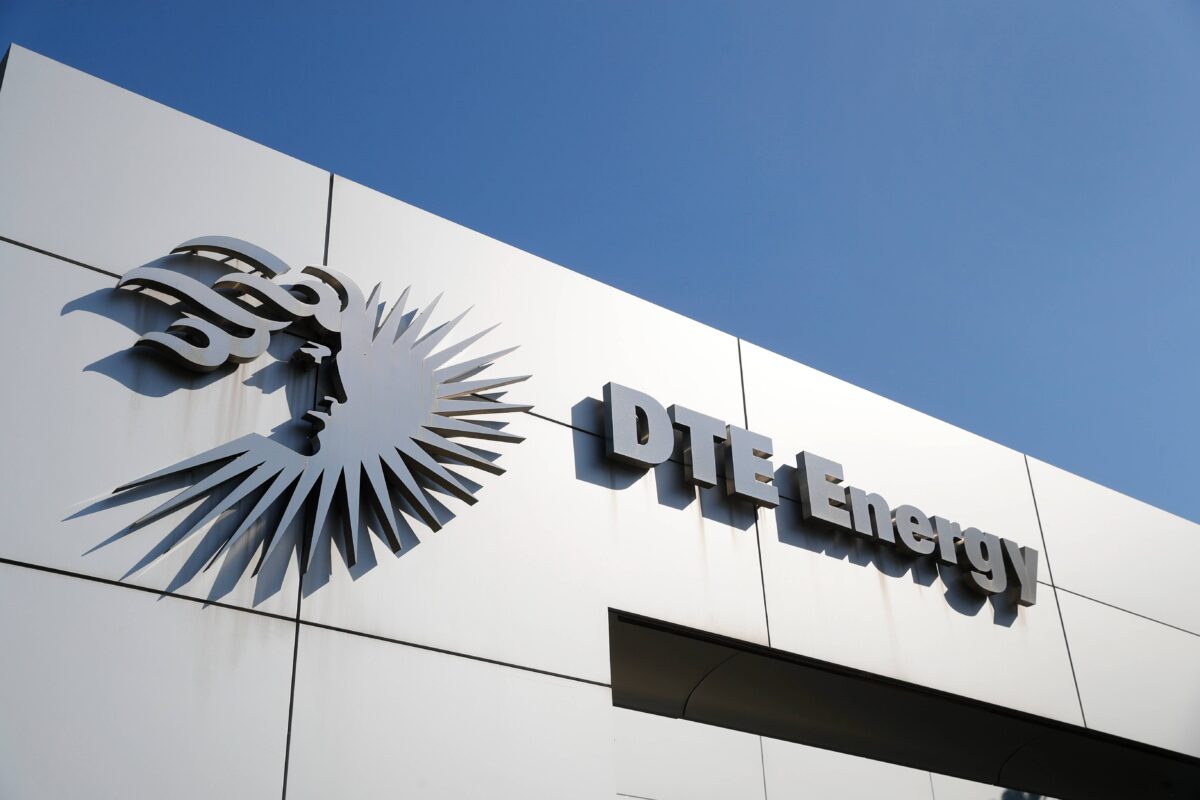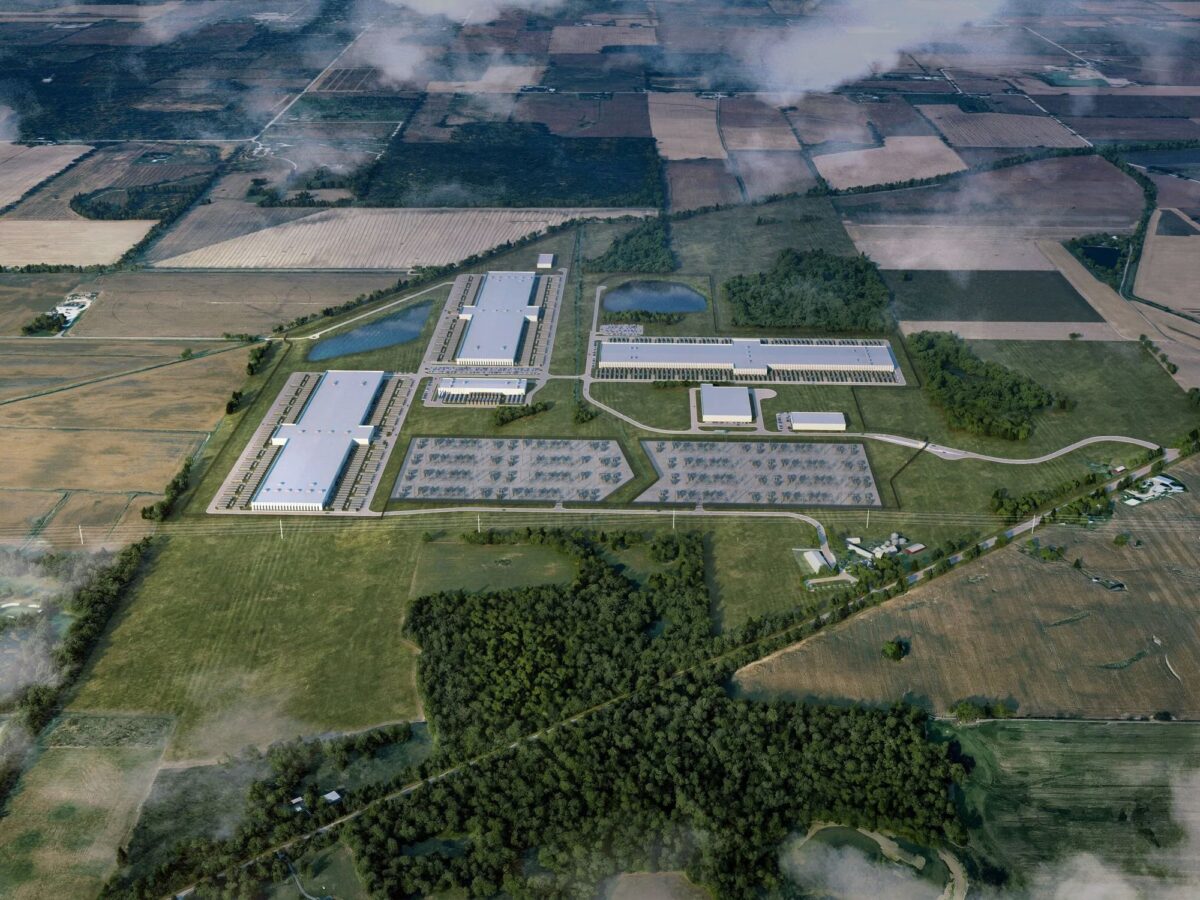Overview:
- Michigan's utility regulator could approve the DTE Energy contracts for a $7 billion Saline Township data center as soon as Dec. 5.
- A resident who lives near the data center site says DTE and the project developer are putting forth "false sense of urgency."
- Read Planet Detroit's tips on how to make your voice heard in data center decisions.
DTE Energy‘s push to fast-track the electricity deal for a massive, 1.4 gigawatt data center in Saline Township is eliciting concern from residents and environmental groups that say more time is needed to ensure the project doesn’t saddle other customers with additional costs.
DTE’s contracts contain a provision that allows the customer to terminate the deal if it is not approved by Dec. 5, 2025, DTE spokesperson Jill Wilmot told Planet Detroit.
The Michigan Public Service Commission’s next regular meeting — where it could vote to approve the electric contracts — is Friday, Dec. 5.
DTE asked the MPSC to consider its data center case ex parte, which can be requested in regulatory proceedings that don’t lead to an increase in rates, charges, or cost of service to customers. Ex parte relief can be approved without notice or a hearing, according to the state.
The MPSC announced it would hold a Dec. 3 virtual hearing on the project that Chair Dan Scripps said will “add an important element of transparency in evaluating DTE Electric Co.’s proposed special contract.”
Michigan Attorney General Dana Nessel said in a statement that DTE’s proposal seeks a green light from regulators for the Saline data center without formal hearings or traditional oversight. A formal, contested case is needed to ensure protections and cost reductions for customers, she said.
A contested case would give the MPSC 180 days from the date of DTE’s Halloween application to consider it, Nessel said.
The $7 billion project for Open AI and Oracle is planned for 250 acres of farmland southwest of Ann Arbor. The Saline Township board voted against rezoning land for the development, but agreed to a settlement after the township was sued by landowners and developer Related Digital.
DTE, data center developer push to quickly advance project
“Related Digital and DTE keep changing the goal posts, and they keep putting forth this false sense of urgency,” Bridgewater Township resident Josh LeBaron told Planet Detroit.

LeBaron, who lives near the data center site, said it could add to Michigan’s energy reliability problems. The MPSC “absolutely” should open up DTE’s data center application as a contested case, he said.
Developer Related Digital initially pushed to begin construction on the data center by October.
When asked to comment on the deadlines for the project, Related spokesperson Natalie Ravitz told Planet Detroit: “this is a fast moving and competitive industry,” and it’s crucial to invest in digital infrastructure to “compete in the global AI race.”
DTE’s Wilmot said the utility is following the “defined process for filing this regulatory request.” The data center customer will absorb the costs of battery storage associated with the project, which will help provide reliable service for all other customers, she said.
Dan Mahoney, director of policy and regional affairs for DTE, told the Saline City Council earlier this month that Oracle could go elsewhere if the tight timeline the utility submitted to Michigan regulators is not met, The Saline Post reported.
Nessel said that without a formal hearing and contested case, the MPSC hearing amounts to little more than “performative listening,” adding that DTE has not backed up its statements that other customers are unaffected by the Saline data center.
“The contracts remain public only under significant redactions and promises made by DTE to hold ratepayers harmless remain flimsy and unsupported in the public record,” the attorney general said in a statement.
DTE may underestimate data center risks: attorney
A contested case for DTE’s data center application would give intervenors access to redacted information in the contracts and provide more time to examine how the project could impact residential ratepayers, said Don Keskey, an attorney representing the Great Lakes Renewable Energy Association.
A contested case could ensure protections from stranded costs if the data center ceases operation before grid investments are paid off, he told Planet Detroit.
Data centers’ often massive water and energy needs have stoked fears in other Michigan communities over how the facilities could imperil water resources, hike electric bills, and jeopardize state climate goals.
The facilities’ electricity demand risks triggering an “off ramp” provision in the state’s climate law, allowing fossil fuel generation to stay online if there’s a capacity shortage.
The Saline data center could carry greater financial risk than DTE presents in its response to Nessel’s petition to intervene, Keskey said.
In its response to Nessel, DTE said its regulatory filing “requests approval of two unique, negotiated contracts specifically tailored to this customer which include bespoke provisions— such as minimum bill protections and termination fees — designed to isolate risk and ensure appropriate cost recovery from the customer.”
DTE’s assessment of Oracle’s creditworthiness, which is referenced in its response to Nessel, “may already be out-of-date,” according to the petition to intervene Keskey submitted for the nonprofit Great Lakes Renewable Energy Association.
He references a Nov. 19 Wall Street Journal article that said the company has a growing debt load and a stock price that’s down significantly from a recent peak, while Moody’s Ratings and S&P Global Ratings “have edged closer to reclassifying the company’s bonds as junk debt.”
Data center investor Blue Owl Capital is offsetting Oracle’s higher risk by charging the company higher rent than for tenants like Meta Platforms, the Journal reported.
To the extent that Oracle is backing the project, any financial difficulties or defaults the company experiences could result in DTE and its ratepayers being left to pay for investments needed to bring the project online, Keskey said.
Oracle declined to comment on this story. DTE did not respond to a question about Oracle’s creditworthiness.
DTE redactions ‘a little bit insulting’
DTE’s regulatory application for the Saline data center contracts shows a lack of transparency, Keskey said.
“Much of the contracts are redacted, and that’s a little bit insulting to the process, because there’s a lot of public interest wrapped into this project that needs protection,” Keskey said.
Pages of text are blacked out in DTE’s application under headings such as project application, operational parameters, post termination obligations, customer credit support, and more.
A contested case would help determine what ratepayer protections are included in the deal because parties could enter into a protective order and gain access to DTE’s contracts without redactions, Keskey said.
DTE’s Wilmot said certain contract terms are commercially sensitive and represent confidential customer information.
“The redacted terms do not impact the cost of service to customers, and the pricing and rate details are not redacted,” she said.
Keskey said protections and guarantees are needed now to ensure costs aren’t being passed on to other customers, adding that it could be difficult to separate the data center costs from DTE’s other expenses once the project is operational.
The MPSC established a framework for addressing such cost allocation issues with a ruling in early November that set rules for how Consumers Energy would serve data centers and other large customers.
Consumers will be required to file six cost-of-service studies and rate design proposals with the state to examine large load customers’ impact on rates. These reports will be used to set rates going forward.
No similar framework is in place for DTE.
The Saline data center will not create added costs for other customers, DTE spokesperson Wilmot told Planet Detroit.
“In its filing, DTE is asking for the Michigan Public Service Commission to approve additional terms of service that create safeguards to protect our existing customers,” she said.
The DTE proposal has a mismatch between the data center contracts and the time it will take to pay back the utility’s investments, Keskey said, adding that it could cost residential customers and other classes of ratepayers.
DTE’s application to the MPSC contains a power supply agreement of roughly 19 years, with an option for the customer to extend it by 20 years. It also contains an energy storage agreement with a duration of 15 years.
The length of these contracts is roughly equivalent to the 15-year contract terms recently adopted by the MPSC for Consumers’ largest customers.
If the customer were to violate the proposed DTE contracts above, it would need to make a termination payment that represents at least 10 years of minimum monthly payments for the power supply agreement.
‘Immense political and industry pressure’
LeBaron, the Bridgewater Township resident, said a contested MPSC case would be a start, adding that the regulator would face significant pressure to approve the project in either scenario.
He named Michigan Gov. Gretchen Whitmer’s support for the project as a reason for the pressure.
In an Oct. 30 press release, Whitmer said the data center is “the largest economic project in Michigan history,” bringing 2,500 union construction jobs and 450 permanent, high-skilled jobs.
The project could have significant economic upsides, Charlotte Jameson, chief policy officer of the Michigan Environmental Council, said in a press release from Nessel’s office.
At the same time, it’s critical that Michiganders are not burdened by infrastructure and energy costs, and for renewable energy growth to occur in Michigan in order to “stave off a rush to build expensive methane gas plants by our utilities,” she said.
Nessel said in her Nov. 18 statement that the MPSC is under “immense political and industry pressure” to fast-track the DTE contracts.
The MPSC declined to comment on this story.
DTE’s application for approval of the data center contracts has racked up nearly 4,500 comments on the MPSC website as of Thursday. Many of them ask the commission to open up a contested case or deny the application.
LeBaron emphasized that he isn’t entirely opposed to data centers, but said they should be built on industrial sites rather than farmland — and more investments are needed to ensure the state can accommodate the facilities.
“We would probably just need to build out a better electric grid and power system before we rush to increase everyone’s rates.”
Editor’s note: This story has been updated to correct the power demand of the planned Saline Township data center: 1.4 gigawatts.
🗳️ What’s next? Tips for civic action
Why it matters
⚡Opponents of a proposal to fast-track approval of an Oracle and Open AI data center in Saline Township say it could impact DTE Energy customers’ utility bills. Data centers’ power demands could make it more difficult for the state to meet its climate goals, depending on what generation sources are used.
Who’s making civic decisions
🏛️ The Michigan Public Service Commission, the state utility regulator, will consider DTE’s filing for the Saline data center and could allow for a contested case in which testimony can be submitted.
How to take civic action now
- 📅 Attend Attend the public hearing on DTE Energy’s application, to be held virtually from 6:30-8:30 p.m. Wednesday, Dec. 3 on Microsoft Teams. Join via the Microsoft Teams link or by dialing 1-248-509-0316 and entering the conference ID 593258092# when prompted.
- Those needing assistance to participate in the hearing may contact the MPSC’s executive secretary at 517-284-8090 in advance of the hearing and are encouraged to do so by Nov. 26.
- 🌱 Follow the Sierra Club Michigan Chapter and Citizens Utility Board of Michigan for advocates’ viewpoints on MPSC activities.
- 📩 Email the MPSC at LARA-MPSC-commissioners@michigan.gov
- ✉️ Mail the Michigan Public Service Commission, PO Box 30221, Lansing, MI 48909
- 📣 Ask the commission if it will open DTE’s filing for the Saline Township data center as a contested case.
What to watch for next
🗓️ The MPSC’s public hearing on DTE Energy’s application for the data center contracts will take place on Dec. 3, followed by a regular meeting of the commission in person and virtually at 1 p.m. Dec. 5.
Civic impact
🌍 Following and engaging with Michigan’s utility regulator is one way residents can influence the impact data centers have in the state.
⭐ Please let us know what action you took or if you have any additional questions. Please send a quick email to connect@planetdetroit.org.
MORE PLANET DETROIT REPORTING
DTE contracts for $7 billion Saline Township data center face public hearing
DTE is asking Michigan’s utility regulator to approve special contracts for electric service for a 1.4-gigawatt data center in Saline Township.
Data centers in Michigan: What you need to know
As data centers proliferate across the Great Lakes, driven by AI’s soaring demands, communities face a dual reality: economic growth and environmental challenges.
$7 billion Saline Township data center reignites concern over Michigan climate plan ‘off ramp’
DTE looks to fast-track OpenAI facility, while environmental advocates raise alarms over utilities’ plans to build more gas plants to meet massive energy needs of data centers.




